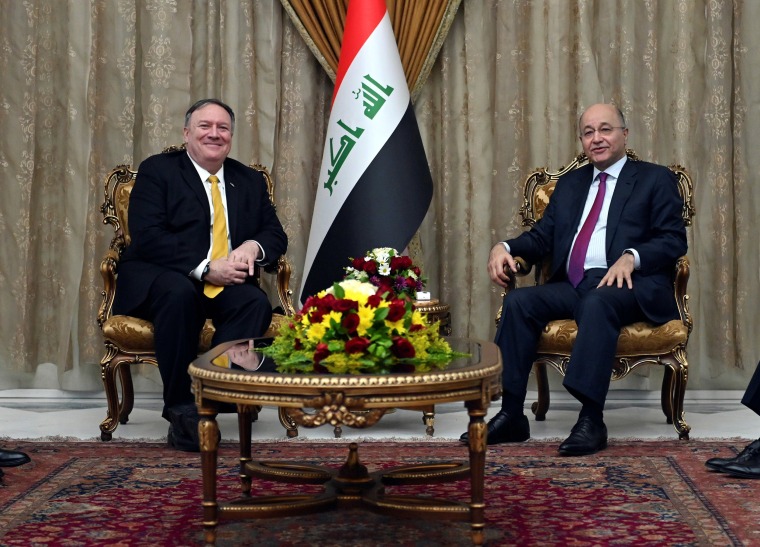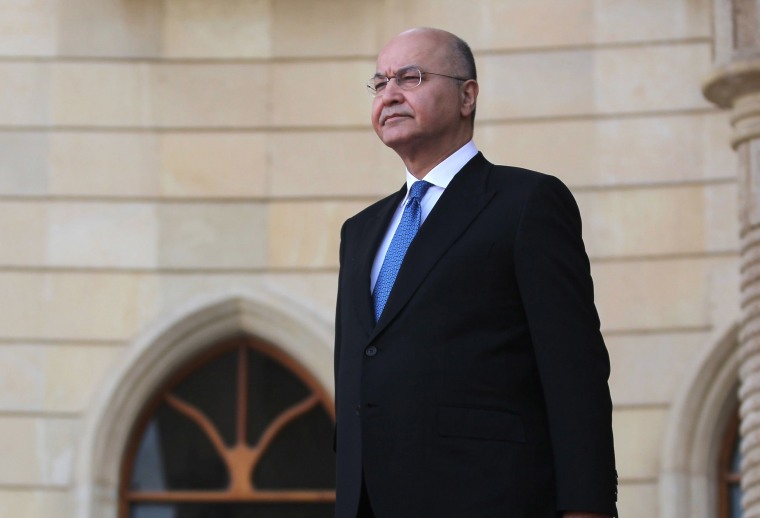American troops do not have the right to use his country to “watch Iran,” Iraqi President Barham Salih said Monday after President Donald Trump indicated a day earlier they were there to do just that.
“We are surprised by the statements made by the U.S. president on the presence of U.S. troops in Iraq,” Salih said at a forum in Baghdad, “Trump did not ask us to keep U.S. troops to watch Iran.”
In an interview with CBS News’ “Face the Nation” that aired Sunday, Trump said it was important to keep a military presence in Iraq so Washington could keep an eye on Tehran.

Salih said that under the agreement between the two nations, the specific mission of American troops was to combat terrorism — not monitor neighboring Iran, according to Reuters. He added that he would wait for clarifications from Washington on the numbers of troops and the nature of their mission in his country.
"Those forces do not have the right to monitor many things, including watching Iran. We will not allow this," he added.
Trump's tough stance toward Iran is a hallmark of his foreign policy. Since pulling out of the landmark Iran nuclear deal agreed to by his predecessor, President Barack Obama, Trump has publicly shown an uncompromising attitude toward Iran and reimposed sanctions on the country.
In the interview Sunday, Trump said the U.S. had spent a “fortune” on the Al-Asad Air Base in western Iraq, which he visited in December, and that it was "perfectly situated" to watch different parts of the Middle East.
“One of the reasons I want to keep it is because I want to be looking a little bit at Iran because Iran is a real problem,” he said.
Asked if he meant he wanted to be able to strike Iran, Trump replied: “No, because I want to be able to watch Iran. All I want to do is be able to watch.”
Iraq has found itself in a tricky position as relations deteriorate between Tehran and Washington. Iran has been deepening its influence in Iraq since the 2003 U.S. invasion.
First Deputy Speaker Hassan al-Kaabi issued a statement Sunday saying the Iraqi parliament would work on a bill in its next session to end the presence of U.S. troops in the country.
“All parties need, as soon as possible, to stop the U.S. presence and not allow Iraq to be used as a springboard for aggression or surveillance of any state,” the statement read.
This is not the first time an Iraqi lawmaker has called for the withdrawal of U.S. troops.
Other lawmakers used Trump’s visit to the Al-Asad Base to call on U.S. forces to leave the country. At the time of his visit, there were 5,000 U.S. troops stationed in Iraq as part of the coalition against the Islamic State militant group.
Earlier that month, Trump announced that American troops would be withdrawn from Syria, claiming that the U.S. had defeated ISIS in the country. He also ordered the Pentagon to draw up plans for a troop withdrawal from Afghanistan.
But during his visit to the Iraqi air base, Trump said he had “no plans at all” to remove U.S. forces from Iraq.
Iraq announced the fight against ISIS was over Dec. 9, 2017, after an Iraqi military campaign backed by the U.S.-led coalition defeated the group which had seized the country's second-largest city of Mosul, as well as one-third of the rest of the nation.


